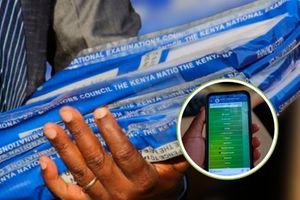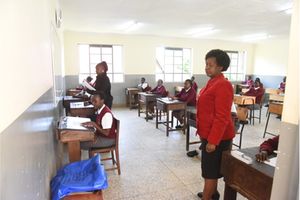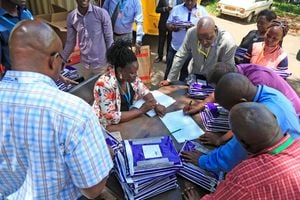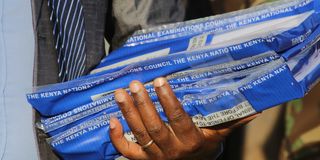
Government officials oversee the distribution of KCSE examination papers at Kiawara Police Station in Nyeri County on November 4, 2024.
Errant teachers are heavily involved in coordinated schemes to beat surveillance and help their students cheat their way to better grades in the ongoing Kenya Certificate of Secondary Education (KCSE) examinations, the Nation can reveal.
As a result, at least 70 teachers have been arrested in the last three weeks across the country for compromising the integrity of the examinations.
They face various charges before the courts and uncertainty over the future of their careers.
More than 20 schools are also on the radar for assisting candidates to cheat their way to success. The Nation has also established that some schools that are notorious for the practice are under close watch and enhanced monitoring.
The new blatant cheating methods have emerged after the Kenya National Examinations Council (Knec) sealed loopholes that were earlier exploited to leak papers ahead of the official time.

Government officials oversee the distribution of KCSE examination papers at Kiawara Police Station in Nyeri County on November 4, 2024.
On Friday, Basic Education Principal Secretary Belio Kipsang denied claims of examination leakages but admitted that some rogue teachers tamper with examination materials once they are handed over to them.
“An examination leakage is where people get exposed to the examination a day or two earlier.
"What we’ve been having is early exposure where people receive the papers and once they’re in school distributing (to the candidates), they take a photo,” Dr Kipsang said.
Parents blamed
On Thursday, the PS blamed parents for mobilising funds that are then used to compromise officials involved in the administration of examinations. He added that the Ministry will give a comprehensive report of the cases reported once the examinations are completed next Friday.
While releasing the 2023 KCSE results, Knec CEO David Njeng’ere said there were 4,113 candidates who were reported to have been involved in irregularities. Additionally, 120 contracted professionals were implicated in the vice.
The Ministry of Education stopped profiling certain regions as cheating hotspots to avoid stigmatising the candidates. There was also backlash from the political leadership who accused the ministry of “targeting” such regions.
Cheating in examinations has evolved into a complex syndicate that involves principals of schools who are the centre managers, supervisors, invigilators, other teachers and non-teaching staff with parents in the background. Security officers deployed to such centres are also paid to look the other way.
A case in Homa Bay County where eight teachers were arrested at Pala Masogo Secondary School after being found photocopying chemistry examination papers illustrates how the new methods work. According to credible sources, the Nyanza region accounts for over 40 of the teachers so far arrested.
“Contrary to the popular belief that leaks are largely online or external, cheating has become a more complex internal affair within the schools themselves.
"The main goal is to create an environment where candidates can carry unauthorised materials into the examination room, freely collude, and openly assist each other during the examination,” a source told Nation.
A police source involved in monitoring the examinations told the the Nation that some of the teachers they have arrested were posing as secretaries, bursars or even security guards since teachers are not allowed into the school compound during the examination period.
“When they open the examination packets, the invigilators either take photos or give them out for photocopying. These are given to subject teachers who are mostly employed by boards of management to quickly work out the answers which then find their way back into the examination room,” the source said.
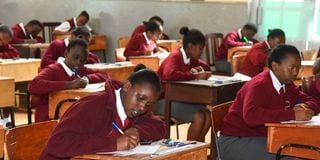
KCSE candidates at Moi Girls' High School in Eldoret town, Uasin County, tackle an examination paper on November 07, 2023.
Knec has deployed its own staff to monitor the administration of the examinations, but they are having it rough in the field. In one case, officials had the tyres of their car deflated by candidates of a school in Nyamira County where they had gone to monitor examinations.
In other cases where collusion is involved, invigilators warn candidates to hide any unauthorised material when external monitors visit. They are also told not to exhibit any suspicious behaviour.
“Much of the cheating happens during the afternoon paper because the senior government officials only monitor the morning paper. After the centre managers pick the afternoon papers at noon, they have two hours with the materials to do whatever they want before the exam begins at 2pm,” another source told Nation.
The double collection was introduced last year to reduce cases of early exposure. Supervisors and invigilators are also rotated after one week at a school to avoid familiarity with the school administration.
To curb cheating, Knec has personalised the question papers which have unique security features. When they get images of the examination papers, they are able to forensically establish the candidate whose paper was photographed and their school.
It is then possible to identify the centre manager and other examination officials present on the particular day. It is this information that Knec then forwards to the TSC for disciplinary action since the commission is the employer.
The Nation has established that some names have already been forwarded, but the exact number will be revealed at the end of the examination period.
According to multiple sources, involvement of teachers in cheating is fuelled by pressure to post good grades from parents as well as promotion by the Teachers Service Commission (TSC).
Although students’ performance in national examinations is not the only consideration for promotion, it carries weight in enhancing a teacher’s chances.
During the principals’ annual conference in June, the school administrators called for administrative and policy changes on promotions and for the TSC to stop censuring principals in case of poor performance of their schools.
Promotion criteria
“There should be a change of promotion criteria to focus on holistic student development. There should be an end to political interference; shield exams from political agenda,” reads one of their resolutions.
Parents have also been accused of giving monetary rewards to teachers based on the grades they post and this, too, is cited as motivation to cheat. They also pile pressure on teachers whose schools do not perform well in national examinations.
Early this year, parents stormed some schools to evict principals following what they perceived as poor performance in the 2023 KCSE examinations. It caused a tiff between the MoE and the TSC when the latter transferred all the teachers from one school leaving the students unattended.

